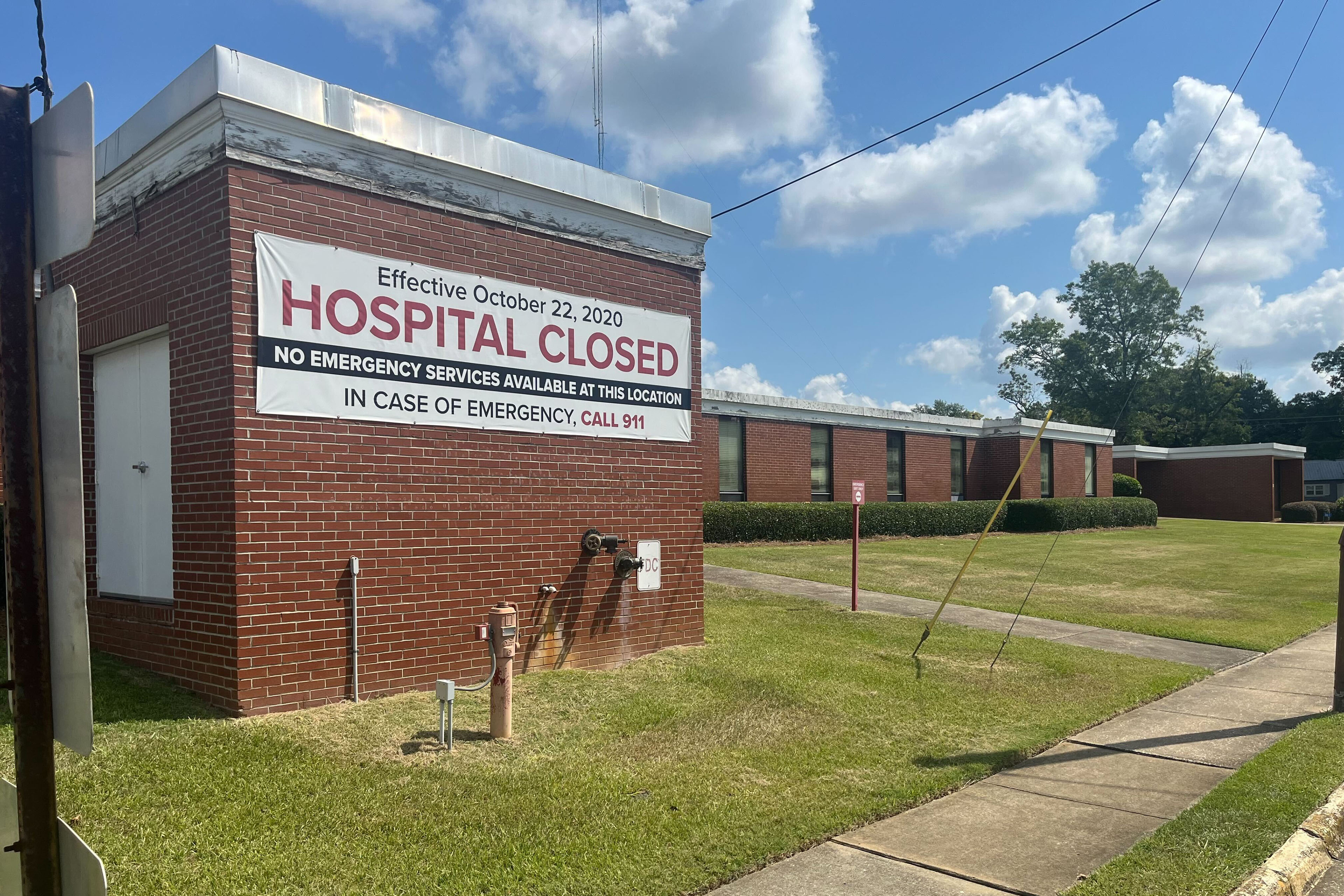ATLANTA — On the shuttered Atlanta Medical Middle, a “Stronger Together” mural sends a hopeful message close to a summer season spray of hydrangeas. The campus was principally quiet on a current weekend, since AMC closed nearly two years in the past. A lone safety automobile sat behind a chain-link fence, and pedestrians handed by with out even a look.
Within the city of Cuthbert, some 160 miles away, the Southwest Georgia Regional Medical Middle additionally stays shut after closing 4 years in the past, one other Southern hospital casualty in a area dotted with them. Even a smaller facility changing the previous Cuthbert hospital “would be tremendous for the county,” stated Steve Whatley, chair of the Randolph County Hospital Authority.
The 2 hospitals — one inner-city, the opposite rural — confronted a few of the similar monetary pressures, together with not having sufficient sufferers with non-public insurance coverage.
This yr, in addition they shared the eye of a few of Georgia’s strongest lawmakers. Laws signed in April by Gov. Brian Kemp, a Republican, included a provision pushed by U.S. Sen. Jon Ossoff, a Democrat.
The regulation amends the state’s “certificate of need” system, which permits present hospitals and different well being amenities to dam would-be rivals’ plans to develop by arguing there’s inadequate want for his or her providers.
Certificates of want legal guidelines exist in 35 states and Washington D.C., in response to the Nationwide Convention of State Legislatures. The hospital business, particularly nonprofit amenities, typically help the principles, and have argued they cut back well being care prices and protect entry to high quality medical providers. Below CON necessities, well being suppliers should acquire approval from the state earlier than providing some new providers or earlier than constructing or increasing amenities.
Whether or not the legal guidelines enhance care or cut back prices is questionable, researchers have discovered, and critics say extra competitors would lower spending by insurers and shoppers. In 2018, the Trump administration issued a report recommending that states repeal or revise their certificates of want necessities, arguing they improve well being care prices.
“The evidence is pretty darn overwhelming that CON laws don’t achieve the initially stated goals of increasing access, lowering costs, and improving quality,” stated Matthew Mitchell, a senior analysis fellow at West Virginia College.
Dan Sullivan, a Georgia-based guide who typically helps hospitals and different medical suppliers of their effort to protect the legal guidelines, stated that by limiting the variety of suppliers providing very specialised well being providers, resembling organ transplants, states can higher keep prime quality of care.
Certificates of want legal guidelines can cut back fraud, Sullivan stated. Florida repealed its certificates of want necessities for hospitals and lots of different well being suppliers following the Trump administration’s suggestion. Fraud accelerated within the state after rules have been phased out, he stated.
“At least when you file a CON, there’s at least a minimum of investigation,” Sullivan stated.
He argued one other advantage of the legal guidelines is that they incessantly mandate a baseline stage of charity care.
Different Southern states just lately peeled again their certificates of want legal guidelines. Tennessee’s legislature handed a invoice this yr exempting extra medical suppliers from needing to use for a certificates. North Carolina rolled again some restrictions in an overhaul that paved the best way for Medicaid enlargement final yr. South Carolina made a big change to its guidelines final yr.
This yr, Republicans in Georgia’s legislature tried to repeal the state’s certificates of want guidelines. The hassle fell quick within the face of fervent hospital opposition.
The narrower laws that Kemp signed would as a substitute ease the guidelines for constructing rural hospitals and exempts a possible new hospital that will accomplice with Morehouse Faculty of Drugs, one of many nation’s few traditionally Black medical colleges.
That might probably fill a lot of the hole left by Atlanta Medical Middle’s closing.

Hospital business officers stated Morehouse would in all probability want a well-heeled accomplice, and Atrium Well being, a part of Charlotte, North Carolina-based Advocate Well being, could also be a logical match. The expansion-oriented nonprofit well being system has partnered with Morehouse Healthcare to run a clinic in East Level, south of Atlanta, and has a rising presence within the state. Each Morehouse and Atrium declined to debate a possible hospital partnership with KFF Well being Information.
The shuttered AMC principal campus, in the meantime, is ensnared in a moratorium the town imposed on redeveloping the location — a response to the jolting choice by its proprietor, Wellstar Well being System, to shut the hospital.
In 2022, Mayor Andre Dickens issued an government order quickly halting any new growth on the location. He has criticized the “unusually abrupt closure of one of Atlanta’s most important medical centers.”
Atlanta’s metropolis council prolonged the ban one other 120 days in June.
A brand new inner-city hospital “would be a heavy lift financially,” stated Josh Berlin, CEO of rule of three, an Atlanta-based well being care consulting agency. That’s as a result of it might draw largely from the realm’s excessive stage of uninsured and Medicaid sufferers. Georgia is considered one of 10 states that haven’t totally expanded Medicaid, and thus has a excessive fee of uninsured sufferers.
“You’ve got a community that is struggling to find care in the wake of the Atlanta Medical Center closure,” he stated.
Grady Memorial Hospital and different Atlanta amenities have seen a bump in affected person quantity because the closure of AMC. Grady is usually deemed “dangerously overcrowded” in one state dashboard.
The necessity to deal with further sufferers has sped up enlargement plans for Grady, together with including greater than 150 beds, stated its chief technique officer, Shannon Sale. “We knew that was going to be needed over time. The Atlanta Medical Center closure sped up that process,” she stated.
In southwestern Georgia, plans are extra modest.
Neighborhood leaders, together with Whatley, are awaiting the outcomes of a feasibility examine that’s anticipated to suggest a downsized “rural emergency hospital,” a brand new federal designation that directs further funding to eligible amenities.

This system ensures hospitals in rural communities further Medicare funds and a further fee of about $3.2 million a yr in the event that they shut pricey inpatient providers and provide solely emergency and outpatient care.
Ossoff gained nearly $12 million in three totally different appropriations payments to help a rural emergency hospital in Cuthbert. He stated he met with state leaders to safe the supply within the Georgia certificates of want invoice that will permit it to reopen. Southwest Georgia Regional Medical Middle would additionally should get an exemption from federal officers to qualify for a rural emergency hospital due to its time limit.
“This is a very challenging thing to do, and we’ve still got significant hurdles to clear,” Ossoff informed KFF Well being Information.
Even when it reopens, the Cuthbert facility will face the identical pressures that led to its shuttering within the first place — what Ossoff known as “failures of state policy.” On the time, he cited Georgia’s choice to not totally develop Medicaid within the wake of the closure.
Brenda Clark, who works in a wellness heart throughout the road from the closed Cuthbert hospital, stated some locals are skeptical in regards to the facility reopening.
“It’s much needed. People are hoping and praying we get it back,” she stated. However “there are some people who say, ‘We’ll believe it when we see it.’”




